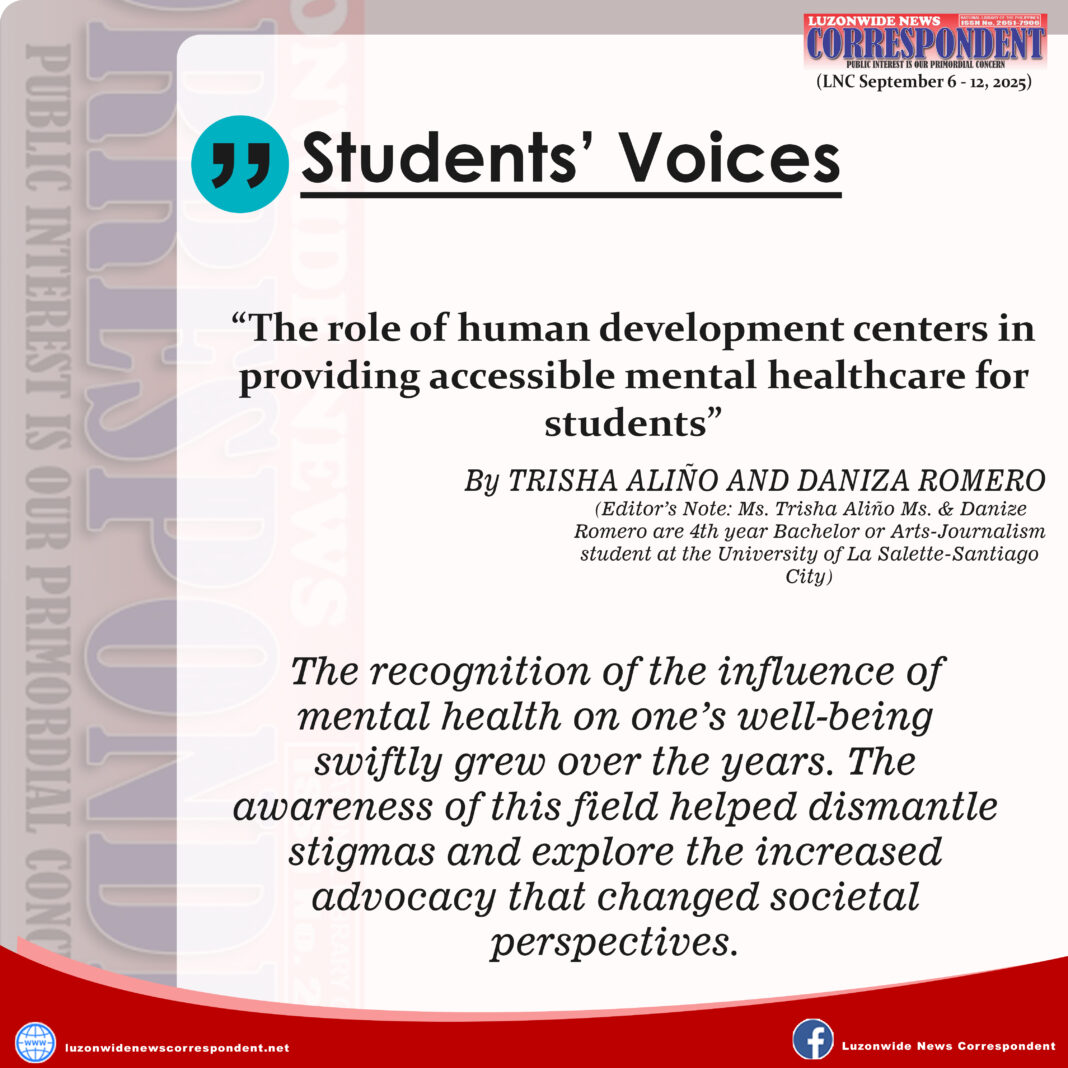By TRISHA ALIÑO AND DANIZA ROMERO
(Editor’s Note: Ms. Trisha and Ms. Daniza are 4th year Bachelor of Arts-Journalism student at the University of La Salette, Santiago City.)
The recognition of the influence of mental health on one’s well-being swiftly grew over the years. The awareness of this field helped dismantle stigmas and explore the increased advocacy that changed societal perspectives. However, a pressing concern of insufficient mental health facilities still occurs in the community. This negatively impacts the individuals, communities, and generally the healthcare system.
The Philippine Mental Health Association Inc. (PMHA) stressed that access to mental health services in the country remains limited and unequal due to stigma and scarce resources. Mental health concerns rapidly increased since the pandemic with fewer and fewer professionals.
Faye Julien Kimayong, a 2nd year Psychology student at the University of La Salette, Inc. shared her views regarding uneducated Filipinos in mental health issues.
“As a Psychology student, I believe that for us to create a more open and effective mental health system in the university, it is undeniable that there are still a lot of people who are ignorant and believe that mental health illnesses are all “just in your head” which is detrimental for the people who have serious and debilitating mental health issues,” she said.
Kimayong stressed the necessity of spreading awareness about the topic in local communities as a first step in fighting the stigma of mental health.
“However, I believe that it is not enough to truly create a change that would improve the mental healthcare of our country which is why it is necessary to follow up with programs and policies that would greatly benefit those who are experiencing mental health issues and their families,” she added.
Truth be told, raising awareness about mental health is an important step, but not enough to make a change and break the stigma. Information about mental health regulation is often inadequate, inconsistent, or poorly enforced, which can limit access to quality care and/or prevention of discrimination. Awareness alone cannot change the negative attitudes and beliefs that people may hold about those with mental illness, which can lead to stereotypes, prejudices, and discrimination.
Mental health is a vital aspect of students’ well-being and academic success. The pandemic has posed many challenges and opportunities for students’ mental health in the Philippines, highlighting the need for more awareness, investment, and action to address the mental health needs of students.
The Human Development Center (HDC) of the University of La Salette, Inc. conducts various services to improve the lives of students with various developmental needs. Its role is to provide interdisciplinary evaluation and care for individuals living with the impact of developmental disabilities and to offer them evidence-based assessments, advocacy, and orientations. With the increasing concern regarding the mental health of the students in the university, HDC is also here to promote a culture of diversity, equity, and inclusion on campus and in the community, and to provide culturally responsive and affirming care to people from various backgrounds, identities, and experiences. Their services are as follows: Orientation, Information, Guidance and Testing Program, Individual Inventory, Follow-up, Counseling, and lastly, Research and evaluation.
Reggie Dianne S. Cunanan, RPm, ULS-HDC Director said that approximately 1 out of 1000 students only acquire the free counseling session offered by the university. While we might think that a low acquirement of counseling services is not a good thing as it could mean that people who need mental support are not getting it due to various barriers, such as cost, stigma, access, or awareness, the university’s HDC Director expressed that it’s necessarily not the case for them.
Cunanan also stated that the HDC regularly organizes orientation to promote mental health awareness in the university. They did not fail to remind the students about the services they provide that can be obtained free of charge. The director further stressed that it is up to the students to maximize the resources offered by the school to help them improve their academic performance as well as their overall being.
The university’s Psychometrician counselor, Gerry D. Garcia Jr. referred to this as a good sign that the office has a lower rate of student counseling. The low acquirement of their counseling services could also reflect a high level of mental health literacy, being able to effectively manage problems that challenge their mental state with self-help strategies, peer support, or community resources. This means that students perform well academically with stable mental well-being.
University of La Salette, Inc.’s Human Development Center also partners with various leading institutions in the Philippines including the University of Santo Tomas, Mapua University, and Ateneo de Manila, to name a few, in conducting psychological testing, as a requirement for students who wish to apply in the said universities. Moreover, they do not only put forward within the academe but also extend their service to the government sectors and hospitals, among others, seeking neuropsychological evaluation.
A low acquirement of student counseling sessions is not a goal in itself, but rather an indicator of the mental health needs and resources of a population. The ultimate goal is to ensure that everyone has access to affordable and quality mental health care and that the students and the whole university population can use it when they need it.
SOURCES:
1.Philippine News Agency (accessed January 14, 2023)
https://www.pna.gov.ph/articles/1211404#:~:text=The%20PMHA%20said%20access%20to,to%20address%20mental%20health%20concerns.
2.Faye Kimayong, ULS, Inc. (Interview done by Trisha Aliño on January 13, 2023)
3.ULS, Human Development Center: (Interview done by Daniza Romero on January 13, 2023) Reggie Dianne S. Cunanan, RPm, ULS-HDC Director, Gerry D. Garcia Jr., ULS-HDC Psychometrician Counselor







